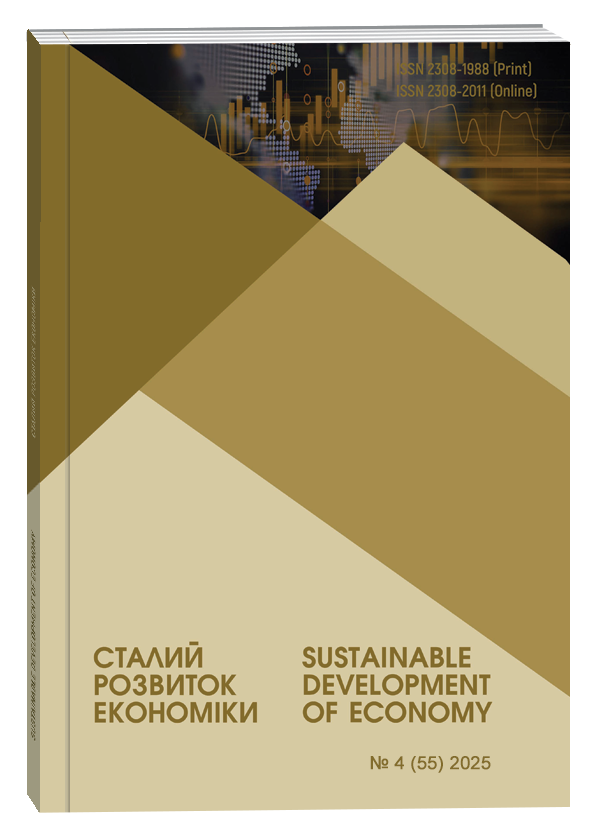FINANCIAL PLANNING IN THE LOGISTICS CHAIN: MODERN APPROACHES TO COST OPTIMIZATION
Abstract
The article examines modern approaches to financial planning in logistics chains, outlines the main directions of cost optimization and increasing the efficiency of financial flow management of enterprises, and also determines their impact on ensuring the financial sustainability of logistics systems. Particular attention is paid to the integration of financial instruments, such as Supply Chain Finance, dynamic discounting and FinTech solutions, with digital technologies (AI, Big Data, blockchain), which allows for cost forecasting, payment automation, risk management and increased transparency of financial transactions. It has been established that the combination of modern financial planning and innovative technologies contributes to improving liquidity, resource control, reducing transaction costs, and increasing the overall efficiency of logistics systems. The importance of a comprehensive approach covering both the internal operational processes of the enterprise and interaction with external supply chain partners is emphasized. The mechanisms of influence of digital technologies on financial interaction between chain participants were investigated and key factors for increasing transparency, sustainability and competitiveness of enterprises in the modern conditions of the global economy, dynamic competition and market instability were identified. The prospects for applying innovative methods of financial flow management for the strategic development of enterprises, optimizing costs and ensuring the efficiency of logistics processes in the long term are outlined, and also emphasizes the role of forecasting financial flows and automation of payments as critically important factors in increasing financial sustainability and efficiency of resource management. Additionally, the need to develop analytical platforms for monitoring financial indicators in real time, which ensures rapid response to market changes, is substantiated. It is noted that the implementation of such tools creates the prerequisites for the formation of flexible, adaptive and technologically oriented logistics systems of the future. The expansion of digital infrastructure and the improvement of financial analytics form the basis for effective strategic resource management, which strengthens the competitive advantages of enterprises in the global economic space. Moreover, the integration of predictive analytics and automated financial control mechanisms further enhances decision-making accuracy and long-term planning efficiency.
References
Feenstra B., Engbers A.R., Steeman M. Supply Chain Finance and its Accounting Treatment. Reclassification of Trade Payables and its implications for the professional field. 2023.Vol. 15 (1). P.45-63
Shevchenko Ye.D. Logistics costs as an object of management in the accounting and analytical system of an enterprise. Economics of Systems Development. 2024. Vol. 6 (1). Р. 46–53.
Бауман О.С. Необхідність впровадження вимог Basel III в Україні та їхній вплив на фінансову систему. Financial and Credit Activity Problems of Theory and Practice, 2015. Vol. 1(18). P. 58–63
Благун С.І. Фінансові інновації як елемент фінансової системи. Вісник Хмельницького національного університету. Серія: економічні науки. 2021. № 6. Том 2. С. 152–157
Кандиба О.К. Технологія блокчейн як платформа для оптимізації логістики підприємства. Сучасні підходи до управління підприємством. Київ, 2019. С. 113–115
Наконечна Т.В., Гринів Н.Т. Застосування новітніх технологій у логістичній діяльності підприємств. Вчені записки ТНУ імені В.І. Вернадського. Серія: Економіка і управління. 2021. Том 32 (71). № 5. С. 16 –21.
Culot G., Nassimbeni G., Orzes G., Sartor M. Artificial intelligence in supply chain management: A systematic review. Journal of Operations Management. 2024. Vol. 68 (2). P. 123–145.
Chen W. AI in logistics optimization with sustainable criteria. Sustainability. 2024. Vol. 16 (3).
Munir M., Bhutta N.T. Impact of supply chain finance solutions on financial performance. PLOS ONE. 2023. Vol. 18 (4). P. 28-41
Feenstra B., Engbers A. R., Steeman M. (2023) Supply Chain Finance and its Accounting Treatment. Reclassification of Trade Payables and its implications for the professional field, 45 р.
Shevchenko Ye. D. (2024) Logistics costs as an object of management in the accounting and analytical system of an enterprise. Economics of Systems Development, vol. 6 (1), pр. 46–53
Bauman O. S. (2015) Neobkhidnist vprovadzhennia vymoh Basel III v Ukraini ta yikhnii vplyv na finansovu systemu [The need to implement Basel III requirements in Ukraine and their impact on the financial system]. Financial and Credit Activity Problems of Theory and Practice, vol. 1(18), pp. 58–63. (in Ukrainian)
Blahun S. I. (2021) Finansovi innovatsii yak element finansovoi systemy [Financial innovations as an element of the financial system]. Visnyk Khmelnytskoho natsionalnoho universytetu. Seriia: ekonomichni nauky – Bulletin of Khmelnytsky National University. Series: Economic Sciences, vol. 6, рр. 152–157 (in Ukrainian)
Kandyba O. K. (2019) Tekhnolohiia blokchein yak platforma dlia optymizatsii lohistyky pidpryiemstva [Blockchain technology as a platform for optimizing enterprise logistics]. Suchasni pidkhody do upravlinnia pidpryiemstvom– Modern approaches to enterprise management. Kyiv, pp. 113–115 (in Ukrainian)
Nakonechna T. V., Hryniv N. T. (2021) Zastosuvannia novitnikh tekhnolohii u lohistychnii diialnosti pidpryiemstv [Application of the latest technologies in the logistics activities of enterprises]. Vcheni zapysky TNU imeni V. I. Vernadskoho. Seriia: Ekonomika i upravlinnia – Scientific notes of V. I. Vernadskyi TNU. Series: Economics and anagement. vol 5. pp. 16–21 (in Ukrainian)
Culot G,. Nassimbeni G., Orzes G., Sartor M. (2024). Artificial intelligence in supply chain management: A systematic review. Journal of Operations Management, vol. 68 (2), pp. 123–145.
Chen W. (2024). AI in logistics optimization with sustainable criteria. Sustainability, vol. 16 (21), pp. 9145.
Munir M., Bhutta N.T., (2023). Impact of supply chain finance solutions on financial performance. PLOS ONE, vol. 18 (4), pp. 28-41


